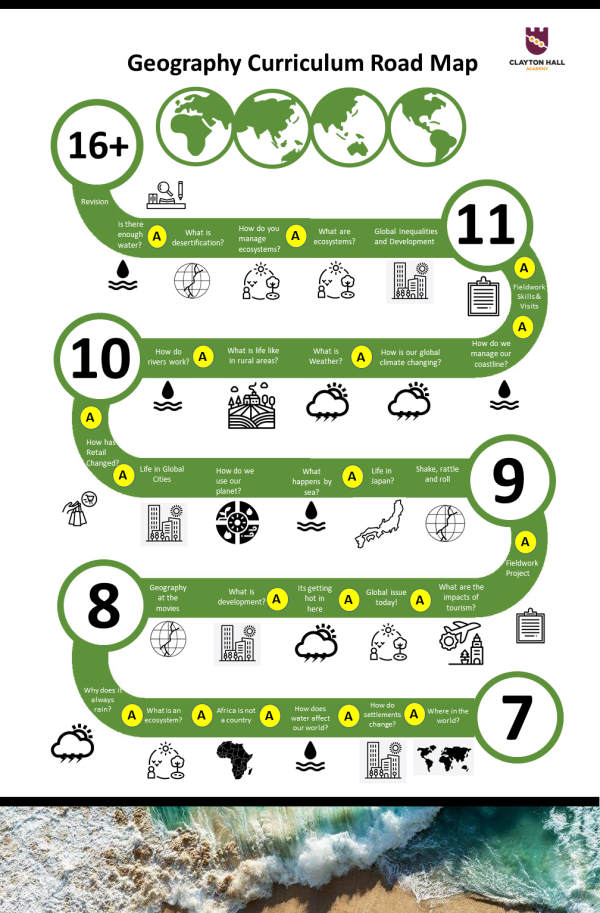Geography
Our Curriculum Intent
A high-quality geography education at Clayton Hall Academy will inspire our students to be curious and fascinated about the local community and the wider world. Students will learn how to become global citizens, who can understand the complex nature of physical and human environments. They will learn how to analyse and suggest sustainable solutions for issues they will face in an ever changing world.

Gold Standard Teaching and Learning across the Faculty
(and subject specific to Geography)
- Effective seating plans to be available, highlighting students who are PP, SEN and G&T
- Assessment maps, interweaved with PLC’s, to be integral in developing a students’ autonomy and understanding of their own progression and target setting
- Retrieval and retention low stakes testing and interleaving.
- Regular use of subject specific terminology (supporting Tier 3 Language Skills) to be used by the teacher and students, across both Key Stages, so that the student’s retention skills are developed, supporting the higher grades at GCSE Level.
- To foster a sense of Geographical Enquiry via the following 4 key areas: a) Creating a need to know, b) Confident use and manipulation of data, c) Making sense and d) Reflecting on learning and being able to critique with effective reasoning. What do each of these 4 key areas cover in more specific detail? See below.
- Creating a need to know: students are encouraged to be curious, to speculate, to hypothesise, to use their imagination and to identify issues.
- Using data: students should be able to locate evidence, collect evidence, select evidence, sort data, classify data and sequence data.
- Making Sense: Students are taught how to relate existing knowledge to new knowledge, describe and explain, compare and contrast, interpret, analyse values and reach conclusions.
- Reflecting on learning & being critical about: students will be able to apply these skills when using data sources, when making judgements, when considering what has been learnt and how, when considering how enquiry could be improved and developed, when evaluating the value of what has been learnt.
Alongside all of the above, the following general pedagogical techniques are also crucial:
- Appropriate differentiation
- Stretch and challenge through questioning, modelling (both student and teacher) and via the variety of tasks set
- Assessment for learning
- Effective use of summative data to inform short, medium and long-term planning
- DIRT
- Pair work, group work and independent work
Key Stage 4 Examination Overview
Exam Board Details: Eduqas GCSE Geography 9-1 Specification B
Qualification Details: Component 1 (1hr 45min Exam), Component 2 (1hr 30min Decision Making Exam), Component 3 (1hr 30min Fieldwork Exam)
What resources could I buy or borrow that will help my child?
WJEC EDUQAS GCSE (9-1) Geography B Textbook (RRP £26.99)
WJEC EDUQAS GCSE (9-1) Geography B Workbook (RRP £5.99)*
My Revision Notes: WJEC EDUQAS GCSE (9-1) Geography B (RRP £9.99)
Geographical Skills and Fieldwork for WJEC GCSE Geography and WJEC EDUQAS GCSE (9-1) Geography A and B (RRP £14.99)
*Highly recommended for revision from Year 10 onwards.
What are the key websites or Apps that my child could use?
www.senecalearning.com – Good for revision for a range of subjects, just remember to look for Eduqas GCSE Geography B
https://www.eduqas.co.uk/media/5ofdo23l/gcse-geog-b-spec.pdf – The exam specification document outlining the topics and what the exam might cover
www.bbc.co.uk/bitesize – BBC Bitesize has an Eduqas section, which is good for revision notes and quick tests
www.maps.google.com – Virtual visits to different parts of the world and mapping exercises.
TEAMS – the School uses TEAMS to share information including revision ideas, so ask you child to look in the ‘Files’ section of their geography team and then select ‘Class materials’ where there will be a folder full of revision tasks.
What can I do to encourage my child to take further interest in Geography?
Any documentaries about the world we live in today, from nature to the UK housing crisis. Geography covers a range of topics so keep up to date with the news and current affairs, which students can use as wider geographical knowledge in their examinations.
Email Links
To find out more about the curriculum we are studying please contact staff via email













